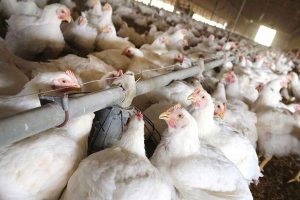By Adrian H. Halili, Reporter
POULTRY integrator Bounty Fresh Group Holdings, Inc. said it will continue to lean on its contract growing program rather than resort to poultry imports, noting that growers need support in the face of rising feed costs and the continued threat of the Highly Pathogenic Avian Influenza (HPAI) or Bird Flu.
“Our focus is on supporting local production, ensuring that the growth benefits local farmers and communities rather than relying on imported chickens,” Bounty Fresh Group Chief Executive Officer Kenneth G. Cheng told BusinessWorld in an email.
Bounty Fresh’s contract growing program provides poultry raisers with feed and other inputs, veterinary care, and technical support.
Mr. Cheng added that partner farmers benefit from a steady income, resources, and expert guidance, which maximizes their productivity while reducing uncertainty.
“The program promotes regulatory compliance, sustainable practices, and innovative farming techniques,” he said. “Through our program, we are also trying to make agriculture an investable market, encouraging financial institutions to lend money to farmers or aspiring farmers.”
Ma. Isabel Ledesma, a contract farmer and owner of Eastvale Farm in La Paz, Tarlac, said contract growing ensures that farms enjoy a predictable income stream.
“It cuts down on financial risks by covering key aspects of the business, like chicks, feed, and medication. This minimizes our initial investment,” she told BusinessWorld via email.
Ms. Ledesma added that contract growers’ partners are a source of guaranteed demand, ensuring that growers no longer need to market to other buyers.
She said Eastvale Farm has taken steps to minimize the risk of a bird flu outbreak.
“We limit access to the poultry houses and ensure that anyone entering follows strict hygiene protocols, like disinfecting hands and shoes. For vehicles entering the farm, we have tire sprayers and wheel baths,” Ms. Ledesma added.
The Philippine poultry industry is still waiting on an approved vaccine, putting biosecurity at the forefront of available measures to curb the spread of the disease.
Some 53 municipalities across nine provinces have active HPAI cases as of Jan 10, according to the Bureau of Animal Industry.
The Department of Agriculture (DA) has said it is seeking to start large-scale trials of an Avian Influenza (AI) vaccine by March. The DA will allocate about P300 million to precure 30 million vaccine doses.
The Philippines has logged its first case of HPAI Type A, Subtype H5N2 in farmed ducks in Talisay, Camarines Norte.
Mr. Cheng said that Bounty Fresh said biosecurity measures can go a long way towards keeping chickens healthy, with “no artificial interventions needed.”
“We’re proud to raise our chickens with no antibiotics ever. That means no antibiotics or steroids at any point in their lifecycle,” he added.
“We also follow strict farm protocols, like requiring showers and clothing changes before anyone enters, to protect our chickens from bacteria,” he said. “These measures allow us to protect our chickens from bird flu and other diseases, ensuring healthier chickens and higher-quality products”
According to the US Department of Agriculture (USDA), Philippine chicken production is expected to increase 3.8% to 1.63 million metric tons (MT) in 2025.
“The poultry industry is still in its growth phase, and we’re optimistic about its potential. Over the next 20 to 30 years, we see promising opportunities for expansion, and we’re excited to play a big part in that journey,” Mr. Cheng added.
He said that strong demand for poultry products is expected to drive growers to improve their productivity.
“There’s strong and consistent demand for poultry, which remains a key protein source for Filipino households. This demand drives producers to innovate and adopt more sustainable practices, aligning with global trends in responsible agriculture,” he added.
However, Mr. Cheng said that the bird flu continues to be a constant threat to the industry.
“The recent H5N2 bird flu outbreak in Camarines Norte highlights the constant threat of disease outbreaks, which disrupt production and require stringent biosecurity measures,” he added.
He said that the influx of imported poultry meat also threatens the competitiveness of the industry.
“(This led) to farmgate prices dropping as low as P80 per kilogram, while retail prices remain high. This disparity puts immense financial strain on farmers,” Mr. Cheng added.
The USDA said Philippine chicken imports this year are expected to rise as the pricing of imported chicken remains attractive compared to domestically produced chicken.
He said that rising production costs and the need for additional investment in biosecurity and climate adaptation measures are drags on the growth of the poultry industry.
“By investing in sustainable farming practices, strengthening biosecurity, and advocating for fairer market dynamics, we aim to overcome these challenges and contribute to the growth and resilience of the Philippine poultry industry,” Mr. Cheng said.

